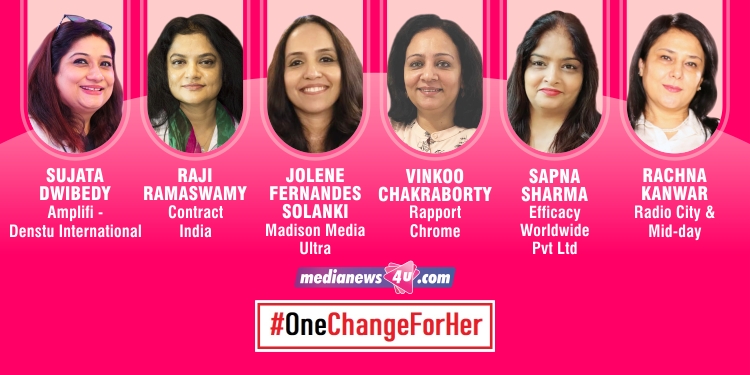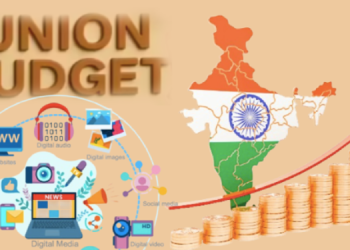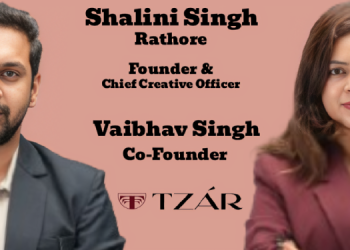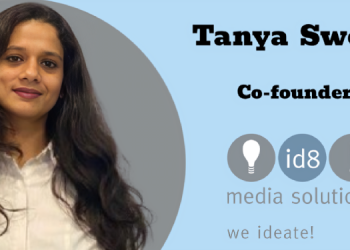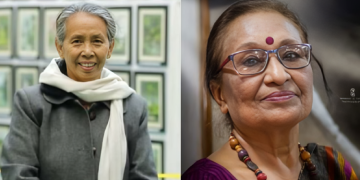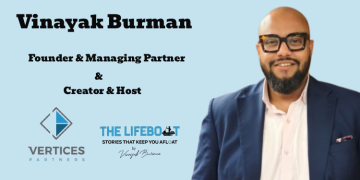Acceptance, respect, individuality, empowerment

The one change that I would like to see in our Industry is to have more women leaders in senior leadership positions. It would create an environment of equal opportunity and an inclusive culture that celebrates diverse talent and new voices and opinions. It would have an impact on the culture of the organisation with everyone adding their originality and views to make the culture richer. Acceptance, respect, individuality, empowerment to build a gender-agnostic and gender-fluid environment that will create equal opportunity for everyone.
– Raji Ramaswamy, Chief Executive Officer, Contract India
Fostering a fundamental shift in management mindset

As we celebrate International Women’s Day, it’s crucial to acknowledge the challenges women face in the workplace due to deep-seated conditioning and biases that have been ingrained over centuries. These biases create macro cultures that impact societies, communities, organisations, and nations. It’s going to take significant effort from organisations to bring about real change, both big and small. This change cannot just be tokenism, but a fundamental shift in the management mindset to sustain and grow women’s participation in the workplace. When this shift happens, it will act as a multiplier for all initiatives and actions to take effect, impacting women at all levels. From safety measures to flexible working hours, daycare facilities, fair career growth, and salary equivalence, these initiatives will become business as usual. One organisation or industry making a real change in the truest sense can spark a revolution that will impact women everywhere. It won’t be easy, but it’s vital that we work towards creating a more equitable and inclusive workplace for all.
– Vinkoo Chakraborty, President, Rapport Chrome
Equality is not just freedom of expression but understanding that expression

Many organisations have taken many steps to make meaningful changes for working women. Flexible working hours, working hybrid, creches in office which have helped many women do very well and grow up the ladder. Today women are treated with equal status across most organisations; however there is still a large gap in mindsets with many people stereotyping women. Education is the most important change in many organisations. While education is instilled at home and schools it lacks most organisations. It’s not about rules or norms that are laid down but educating both genders at work too.
Equality means knowing that a woman has to juggle between work and home and still give her opportunities, equality means giving her the flexibility to work from home on those monthly days, equality is not just freedom of expression but understanding that expression, equality means having a good gender ratio balance.
– Jolene Fernandes Solanki, COO, Madison Media Ultra
Ensure, enable and empower next generation of women leaders

Women construe leadership requirements differently. They are rapport builders while being result-oriented. Throughout history, women are known to have exhibited extraordinary courage, yet their leadership traits have often been underrated. They are quick in shifting gears at the individual, organisational, societal, and public levels.
However, the one thing I have seen in the last 24 years is that there are very few women in leadership roles! They say change should start at home, so the current women leaders must be more compassionate for other women, they should mentor, nurture, allow, and support other women to grow. Also, the managers (men or women) need to be sensitised on how to manage a gender-neutral team and have an impartial non-judgmental approach.
In India, a working woman shoulders a lot more responsibility than a man. Though she is more productive and sincere, she has a lot to manage. It is time for all of us to commit to the next generation of women leaders to ensure, enable and empower them.
– Sujata Dwibedy, Chief Investment Officer, Amplifi (denstu International)
Launching a Technical Training Program to Empower and Advance Women in the Workplace

As a sector that relies on creativity and innovation, the media and radio industry is known to embrace diversity and inclusivity at workplace at a macro level but there should be a deeper representation of women across all levels and department. To accomplish this, we must first confront the implicit prejudices and preconceptions that exist in the industry. We must then actively seek for and recruit diverse personnel, provide fair opportunity for growth and development, and create an inclusive culture.
Implementing a systematic training program for women in technical departments is one significant reform that might make workplaces in the media and radio industry more inclusive, diverse, equal, thereby empowering women. Radio stations rely significantly on technical staff to maintain seamless and effective broadcast operations. By providing formal training and development opportunities for women in technical roles, radio stations can foster a more diverse and inclusive work environment in which women feel motivated to pursue technical jobs. In addition to technical training and certification programs, it may also include initiatives to recruit and retain women in technical areas. We should additionally organise a training programme on unconscious bias for the organisation.
In the long run, this initiative will do wonders for the radio business as a whole, fostering a more diverse environment. Here’s to strong women: may we know them, may we be them, may we raise them!
– Rachna Kanwar, COO – Digital Media, Radio City and Mid-day
#WorkFirstFamilyForemost

From times immemorial, we have come across best of the organisations, having best of the HR policies – promoting gender equality, inclusiveness and all sorts of work life balance processes ending up having an unsaid bias towards their women employees. Women don’t work late (despite them spending much less time on non productive things in office), women take more holidays, they have households to take care of hence less attentive to work etc are, in a way, accepted biases by our societies.
All these biases make women work extra diligently to ensure they are not judged the wrong way at work and end up trying to please their families so that the families don’t judge them for having spent that entire day at work. This has led to most women I know – what I call – living in guilt all the time. At home feeling guilty for not extending their work hours with the team working late from office, and at home for getting late from work and unable to give the family the attention (in their mind) which it deserves.
#GuiltFreeLiving is the #OneChangeForHer which I have embarked upon myself and for my organisation. In a way, when I set out implementing this I checked the hypothesis by discussing this with various women team members and invariably all of them have at some point in time – or always – have felt the same. Leave aside the team members – I myself working at a senior role – have felt the guilt of not being there for my young daughters at times and sometimes missing the all-important client meeting for attending the fixed-schedule development discussion of my kids at their school.
#WorkFirstFamilyForemost is the mantra I am trying to imbibe in my women teammates. Not only the women teammates, when this was discussed with various men also, they felt the same way but were a little less guilty. This, I feel is more from the evolution of mankind, from the time of Neanderthals all through the journey to Homo Sapiens where the men have been hunters, hence less time spent at home and more at work has become a DNA imprint which makes them more guilt free.
Thus, in a nutshell, we can’t change the society at large, but we can always, in our own way, promote women to be more open to acceptance and not be bogged down by the burden (or overburden) of societal acceptance and please-all attitude and live a guilt free version of themselves.
– Sapna Sharma, Co-Founder and COO, Efficacy Worldwide Pvt Ltd.

